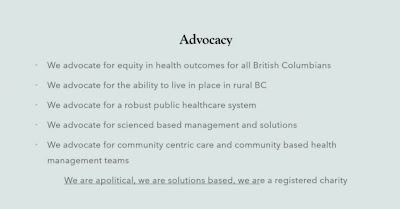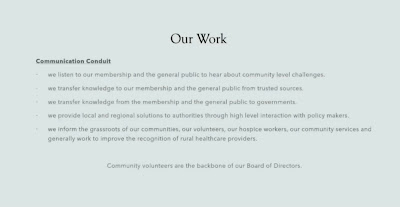 |
| Paul Adams from the Rural Health Network made a video presentation to Council on Monday on the work of the group in BC |
The timing couldn't have been better for the Rural Health Network and their recruiting drive in Prince Rupert, with Executive Director Paul Adams seeking the participation of the City of Prince Rupert in their province wide advocacy group.
With the backdrop of a week's worth of ER Closures as part of Monday's Council session, Mr. Adams appeared via video presentation to share some background the organization's work.
Through the presentation, Mr. Adams outlined for the Council membership some of the benefits that the organization has to offer communities across the province.
The organization has been raising concerns about the state of the health care crisis in the rural areas of the province since that time and outlined the benefits that Prince Rupert could find by joining in with the other communities that make up the Network.
His short overview for Council provided a look at their engagement work and explored many of the health care issues that are shared across BC, though as he observed to an attentive council, each community is very different in its situations.
Towards questions on the night, Councillor Forster asked how communities could contact them towards more on their work in rural communities.
She also asked if Jennifer Rice, who is Parliamentary Secretary for Rural health was involved with engagement with the organization, as well as to their engagement with health care professionals.
Mr. Adams observed that they are engaged with both Ms. Rice and the other political leaders in the province, as well as to explain towards their communication work with front line health care professionals.
"I work very closely with Parliamentary Secretary Rice, I work with the Minister directly, I work with anybody who has an interest in rural initiatives and health care.
So we don't work, you know we're non partisan, we work across the political aisle.
So any time that we're meeting and we're presenting a solution or a position forward we do that apolitically"
For Councillor Nick Adey, the focus for his questions was to note of their website and how it provides a good volume of material for the community. He then asked towards their pitch to have Prince Rupert join the Rural Health Network, noting how MLA Rice has advocated for it.
Mr. Adey then asked what would change in how to address the concerns for Prince Rupert should they decide to join.
Mr. Adams noted of the still developing footprint of the Northern membership.
The Rural Health Network currently has participation from 30 Municipalities, 2 Regional Districts, 61 Organizations and 21 Individual members.
Towards that footprint, he outlined how each provides background that goes towards their research and advocacy to Health officials and government.
"We do have a fairly scarce membership in the North but that has got more to do with my ability to reach enough communities and we are currently you know under financed from the standpoint of being able to do more.
But with what we have we try to do a lot.
Everybody is, every member is welcome to get involved, we have a group called our Implementation Committee and we really do bring the brightest minds in the province together.
And there we look at the challenge that we're facing and then we collectively create solutions around those challenges and then we support then with the research and evidence that I was talking about"
Mr. Adams also noted of the current ER Closures in Prince Rupert and outlined how that is a frequent problem for many areas.
"You know, it's a problem that you've recently encountered; but we've encountered across the province for way too long.
We're looking right now at putting in the suggestions on contingency planning about how we can prevent these closures in the future and again that's a cooperative effort to bring people and communities that have been affected ...
There's just been so many emergency closures and they've all been in rural and remote communities, none of them are impacting on urban centres and we see that inequity needs to be addressed too"
Councillor Niesh asked about local recruitment in the north, the response noted how with a focus on urban recruitment for education in medicine, many of those graduates return to the large communities.
To that Adams noted that the Network has long been advocating for a more decentralized approach towards both education and medical practice and services in the rural areas.
"Part of the challenge that we face across rural BC is the lack of recruitment in rural communities and we're only picking urban students to fill these new seats, to create new positions for the future, then those students are likely to return to urban environment.
So we really need to do a better job of recruitment of students from rural and remote communities across the province.
We've been a champion of the Physician's assistants and bringing more Physicians assistants into play. That's now been regulated so Physicians Assistants are basically monitored by a Physician but work independently of a physician so it's a really good way to extend a Physician into a multiple role."
Councillor Cunningham noted of the biggest problem coming through of education and outlined how other areas of the country ensure that the needs of rural communities are addressed.
He also noted of some of the inequalities found in the health care system particularly withe the dynamic of the on staff nursing model compared to the travel nurse program, which is impacting on rural communities.
"The agency nurse piece is a huge problem, the inequity there for local nurses who are working for the health authority versus the one's coming in and travelling its almost night and day
Not necessarily in pay equity, but in lifestyle equity, you know in the amount of on call that you have to do and the Overtime hours being put in.
Those are all extremes that the local resident nurse faces, where as the one flying in or coming in for a short term visit doesn't
So we've got to fix these problems and they are creating huge imbalances and a lot of cost to the system and it's been ongoing now for decades unfortunately, so we've got a long trouble to rectify"
To bring the presentation to a close, Mr. Adams made one final pitch for Prince Rupert to join the Network observing of the entry cost of 50 dollars, which he noted was a small cost to add Prince Rupert's voice to the network.
Toward the initiative, Council made no decision on Monday towards the fifty dollar investment that would be required to become part of the Rural Health Network.
You can review the full presentation to Council from the City's Video Archive starting at the 42 minute mark.
You can review what the Rural Health Network is all about from their website.
More notes on Monday's Council session can be reviewed here.
A wider overview of Health care in Prince Rupert can be explored through our archive page.





Ecotrust got $30k from the city as per their SOFI.
ReplyDeleteWhat’s $50?